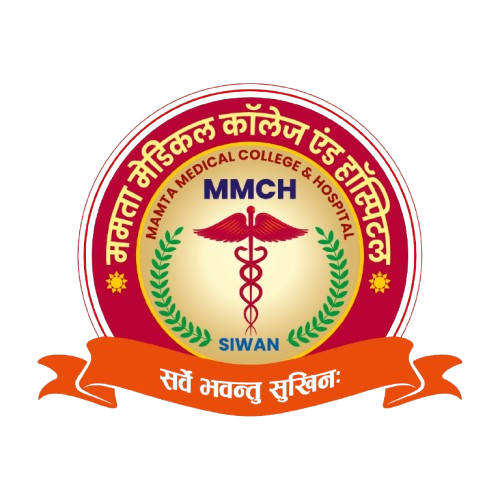
🔬 Department of Radiation Oncology
Mamta Medical College & Hospital, Siwan (MMCH)
The Department of Radiation Oncology at Mamta Medical College & Hospital, Siwan, is committed to the comprehensive diagnosis, planning, and treatment of cancer using advanced radiation therapy. Our department is at the forefront of cancer care in the region, combining state-of-the-art technology, expert faculty, and compassionate care to provide the best outcomes for our patients.
We are dedicated not only to clinical excellence but also to medical education, research, and community outreach, empowering the next generation of doctors with the knowledge and skills necessary to combat one of the most challenging diseases of modern times.
🎗️ Introduction to Radiation Oncology
Radiation Oncology is a medical specialty that uses ionizing radiation to treat cancer and other conditions. It involves the controlled application of high-energy radiation to destroy cancer cells, shrink tumors, and relieve symptoms. The goal is to maximize cancer cell destruction while minimizing damage to surrounding healthy tissue.
Radiation Oncology plays a central role in the multidisciplinary management of cancer, alongside surgical oncology and medical oncology.
🏥 Department Overview
The Department of Radiation Oncology at MMCH offers:
Modern Radiation Therapy Units (Planned installation)
Dedicated Oncology Wards and Consultation Rooms
Simulation and Treatment Planning Suites
Multidisciplinary Tumor Board Meetings
Comprehensive Support Services including pain management, palliative care, nutrition counseling, and psychological support
We are fully aligned with the latest national and international treatment guidelines, ensuring safe, effective, and ethical care for every patient.
🧠 Academic Excellence & MBBS Teaching
The department plays an important role in the undergraduate medical curriculum. As per the National Medical Commission (NMC) guidelines, MBBS students are introduced to the fundamentals of cancer biology, the principles of radiation therapy, and its clinical applications.
Key Academic Areas Covered:
Basics of cancer pathology and tumor biology
Principles and types of radiation therapy (External Beam, Brachytherapy)
Radiation safety and protection
Indications and contraindications for radiotherapy
Side effects and their management
Role of radiotherapy in various cancers (e.g., head & neck, breast, cervical, lung, brain tumors)
Integration of radiation with chemotherapy and surgery
Teaching Methods:
Didactic lectures with audiovisual support
Clinical case discussions
Demonstrations of treatment planning systems
Visits to radiotherapy planning and simulation units
Student seminars and tumor board participation
Interdepartmental integrated teaching with Oncology, Surgery, and Pathology departments
We aim to instill not only knowledge but also sensitivity toward cancer patients through compassionate clinical training.
⚙️ Clinical Services & Patient Care
Our department provides comprehensive radiation oncology services with the following:
1. Radiation Treatment Services (Planned/Phase-Wise Implementation):
External Beam Radiation Therapy (EBRT)
Conformal Radiotherapy (3D-CRT, IMRT)
Image-Guided Radiotherapy (IGRT)
Brachytherapy for gynecologic and head & neck cancers
Palliative Radiotherapy for advanced cancers
Stereotactic Radiosurgery (SRS) and Radiotherapy (SRT) in collaboration with regional centers
2. Treatment Planning and Simulation:
Use of CT-based simulation and planning software
Dose-volume histogram (DVH) analysis
Organs-at-risk (OAR) sparing protocols
Multimodal integration with MRI and PET-CT when available
3. Supportive & Holistic Oncology Care:
Symptom management (pain, fatigue, nausea)
Psychosocial support and counseling
Nutrition and lifestyle advice for cancer patients
Cancer rehabilitation services
💻 Cancer Types Commonly Treated with Radiotherapy
Our department works closely with Surgical Oncology, Pathology, and Medical Oncology departments to treat a wide variety of cancers:
Head & Neck Cancers – Oral cavity, larynx, oropharynx
Breast Cancer – Post-operative radiotherapy, boost therapy
Gynecological Cancers – Cervical, endometrial, vaginal cancer
Lung Cancer – Palliative or curative radiotherapy
Brain Tumors – Gliomas, metastases, meningiomas
Prostate Cancer – Curative or adjuvant radiotherapy
Esophageal and Gastrointestinal Cancers
Pediatric Malignancies – Wilms tumor, medulloblastoma
Palliative Radiotherapy – Bone metastases, spinal cord compression
👩🏫 Faculty & Departmental Strength
Our team of experienced radiation oncologists, medical physicists, radiotherapy technologists, and nursing staff work in unison to deliver precise and patient-centered care.
Faculty Team (Indicative Titles):
Professor & Head, Radiation Oncology
Associate Professor – Clinical Planning & Research
Assistant Professor – Undergraduate Training
Radiation Physicists – Treatment Calibration & Planning
Radiotherapy Technologists – Treatment Delivery Experts
All staff are trained in radiation safety protocols and follow the Atomic Energy Regulatory Board (AERB) guidelines.
🔬 Research & Innovations
The Department of Radiation Oncology promotes academic research in areas such as:
Clinical outcomes of radiation therapy in various cancers
Comparison of conventional vs. conformal therapy
Radiation toxicity and mitigation strategies
Role of radiotherapy in low-resource settings
Awareness and perceptions about radiotherapy among rural populations
Students are encouraged to participate in research activities, audits, and publish findings in medical journals and present them at national and international oncology conferences.
🩺 Role in Multidisciplinary Cancer Care
The department actively participates in Tumor Board Meetings, discussing complex cancer cases along with:
General Surgery & Surgical Oncology
Medical Oncology
Pathology
Radiodiagnosis
Palliative Medicine
This collaborative approach ensures individualized cancer care and evidence-based decision-making for each patient.
🛡️ Radiation Safety & Quality Assurance
We follow stringent radiation safety protocols in all procedures:
Regular calibration of equipment
Use of personal dosimeters for staff
Shielding of walls and treatment units
Radiation safety training for all personnel
Compliance with AERB and BARC guidelines
Periodic quality checks and equipment maintenance
🎓 Vision & Mission
Vision:
To be a leading regional center for cancer care and radiotherapy education, offering cutting-edge treatment with compassion and clinical excellence.
Mission:
Deliver high-quality, affordable radiotherapy services
Educate and train future doctors in cancer medicine
Conduct impactful research in oncology
Raise awareness about early cancer detection and treatment
Maintain the highest standards of safety and ethics in radiotherapy
🤝 Community Outreach & Cancer Awareness
The department organizes cancer screening camps, health talks, and public awareness programs in collaboration with the Department of Community Medicine. These programs focus on:
Early detection of breast and cervical cancer
Tobacco cessation programs
Awareness about childhood cancers
Counseling and support for caregivers
Women’s health and reproductive oncology
We are dedicated to reducing the cancer burden in Bihar through prevention, awareness, and early intervention.
